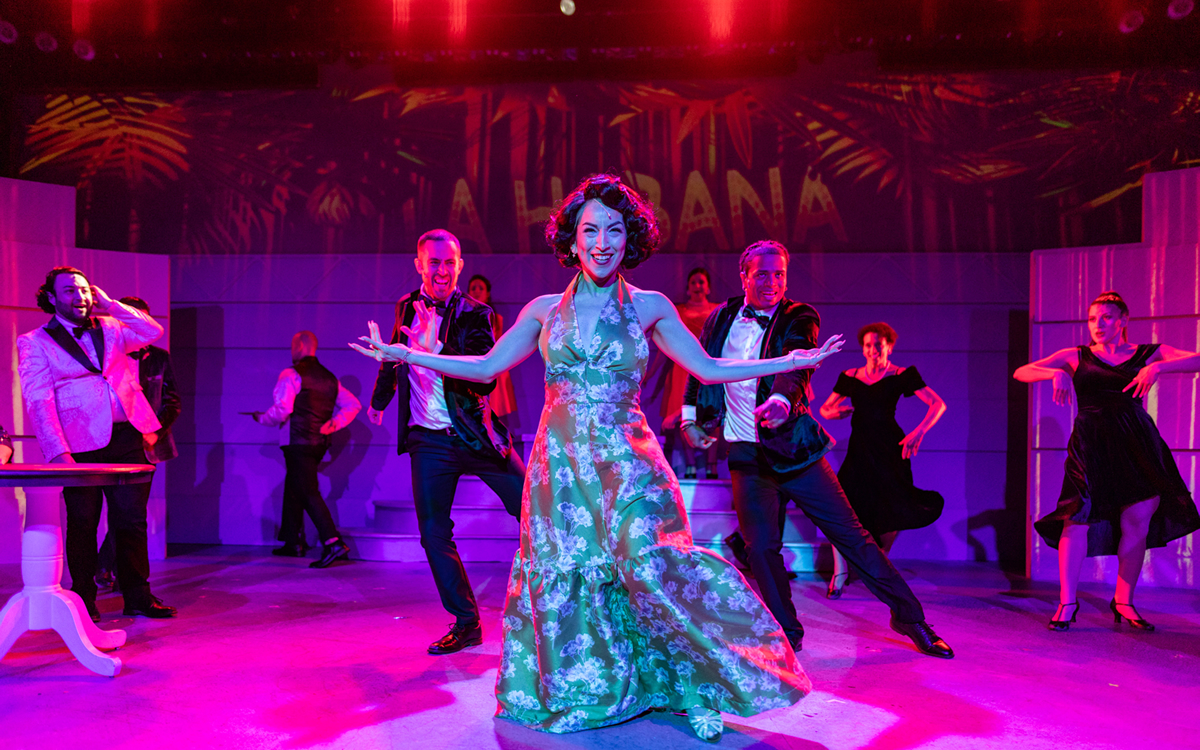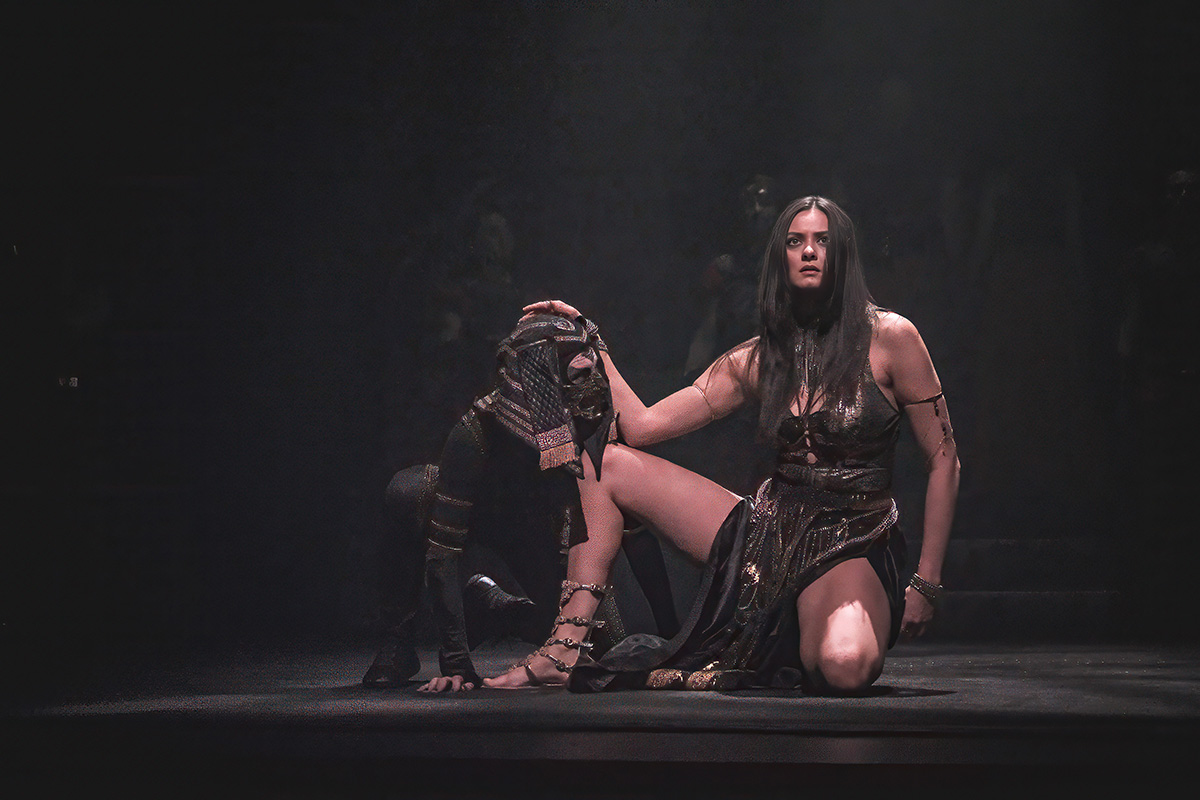Theater
A preview of this year’s Helen Hayes Awards
Strong queer representation among diverse nominees

2023 Helen Hayes Awards
May 22, 2023
For tickets go to theatrewashington.org
After three years of varying and virtual approaches, this year’s Helen Hayes Awards will be more familiar with the honors being doled out live and in person on Monday night at the Anthem.
Integral in making the 37th awards both fun and sufficiently formal is delightful actor/director Holly Twyford who’s been tapped to both co-host and co-direct the annual ceremony. “For me, it’s not as hard as it sounds,” she explains modestly. “Will Gartshore [co-director and celebrated Washington actor] has done the lion’s share of the work. He’d already written an entire script by the time I stepped in. He’s really smart and knows music.”
Undeniably, Twyford brings a lot of experience to the gig. She’s been attending the awards since the early ‘90s, and remembers meeting the late “first lady of American theater” for whom the Awards are named, and shaking her hand. She’s also the recipient of multiple Helen Hayes Awards and so many nominations it’s been written into Monday night’s show. And while Twyford understands the show’s inherent excitement and spontaneity, she’s also aware of the challenges involved in creating a successful evening.
“I was just saying to my wife, these kinds of things are not easy to orchestrate,” Twyford continues. “It’s great and amazing to celebrate our community and its artistry, but it’s tricky to have everyone heard and appreciated. It’s a lot to do in one night, but we have to remember it’s more than giving out awards, it’s an opportunity to stop and look at the community.
“For instance, we have non-gendered acting categories. When you divide between men and women, some members of the theater community are left out. It’s that simple.”
This year, the music-filled awards ceremony is divided into two parts. Twyford shares hosting duties with local favorites Naomi Jacobson, Erika Rose, and Christopher Michael Richardson. Also on board in a guest spot is Broadway star Michael Urie who’s currently finishing up a run of “Spamalot” at the Kennedy Center. Urie enjoys a long connection to Washington’s Shakespeare Theatre Company where he played the title prince in Michael Kahn’s 2018 “Hamlet,” and last summer co-starred with husband Ryan Spahn in Talene Monahon’s wonderful plague-set comedy “Jane Anger.”
The awards selection process is arduous. Recognizing work from 131 eligible productions presented in the 2022 calendar year, nominations were made in 41 categories and grouped in “Helen” or “Hayes” cohorts, depending on the number of Equity members involved in the production with Hayes counting more.
Nominations are the result of 40 carefully vetted judges considering 2,146 individual pieces of work, such as design, direction, choreography, performances, and more. Productions under consideration in 2022 included 39 musicals, 97 plays, and 38 world premieres.
Many of this year’s sensational nominees (actors, designers, directors, writers, etc.) come from the queer community. Here’s a sampling.
Rising director Henery Wyand is nominated for Outstanding Direction in a Play for Perisphere Theater’s production of Tanya Barfield’s “Blue Door,” the striking tale of a contemporary black professional who comes face to face with 19th century ancestors. In addition to directing, Wyand also designed the lighting, set, and costumes.
After graduating from Vassar, he came to D.C. for Shakespeare Theatre Company’s prestigious fellowship program. About directing, Wyand says, “there aren’t a lot of specifically young queer Black directors out there. It gives me a sense of urgency to make sure underrepresented stories are shared. And if I don’t do that who will?”
And regarding his nomination, his sentiment is sweet: “Awards are a way to give flowers to people who are creating things. Living artists don’t always receive appreciation for their work.”
When Emily Sucher learned she’d been nominated for a Helen Hayes Award (Outstanding Choreography in a Play) for “To Fall in Love” with Nu Sass Productions, she seriously thought she was being punked.
“I got the news in a text from an unfamiliar number. I didn’t believe it at first,” she says. As an intimacy choreographer, Sucher is called on to stage stories with content of an intimate nature, and she just wasn’t sure it was something that Helen Hayes’ judges were looking to recognize. Clearly, they were.
Sucher adds, “Being queer shapes who I am as an intimacy choreographer and fuels my passion to tell all kinds of stories, and to show what sex and intimacy can look like. It’s not always the same.”
Out Chilean actor Fran Tapia is nominated for Outstanding Supporting Performer in a Musical for her work in GALA Hispanic Theatre’s world premiere Spanish-language production of “On Your Feet! The Story of Emilio and Gloria Estefan en Español” (the production leads the nominee pack with fifteen nods including Outstanding Ensemble for a Musical).
As Gloria Fajardo, pop star Gloria Estefan’s embittered mother, Tapia garnered rave reviews.
“Singing my character’s song — ‘If I Never Got to Tell You — breaks my heart, and that it was translated into Spanish by Gloria Estefan and her daughter Emily Estefan who is gay makes it ever more significant to me. I had the honor of introducing this version of the song to the world.”
Tapia left her native Santiago, Chile, for Washington when her wife was posted at the Chilean Embassy. It was in the thick of the pandemic, and there weren’t a lot of theater opportunities, so she thew herself into Divino Tesoro, a podcast where children and adolescents can discuss gender identity, and she also worked as director of GALA’s youth program. It was the GALA job that led to an audition to play Gloria.
She’s currently touring as Gloria Fajardo in the original English version of “On Your Feet!” During its June and July break, she’ll appear in Lin-Manuel Miranda’s musical “In the Heights” at the Pennsylvania Shakespeare Festival, and then in August it’s back to playing Gloria at the pretty seaside Ogunquit Playhouse in Maine.
Despite her intense work schedule, Tapia isn’t missing Monday’s event: ““I’m honored to be nominated, yes. But I definitely want to win!”
Talented local actor Michael Kevin Darnall is vying for Outstanding Supporting Performer in a Play for his memorable comic turn as wonderfully flamboyant Isom in Studio Theatre’s production of Katori Hall’s “The Hot Wing King,” a layered dramedy about Black men loving Black men, and yes, a hot wing competition.
This is Darnall’s seventh Helen Hayes Award nomination prompting him to dub himself the DMV’s Susan Lucci, (after the soap star who was nominated 19 times before finally winning an Emmy). Typically cast as the brooding young man, the biracial and bisexual actor fought hard to play Isom. “There’s a lot of my mom in the character,” he says, “so in part, all of this is a tribute to her.”
The first time Darnall read for a Black role was five or six years into his professional career: “Playing Black men has been few and far between for me, so to play Isom as part of a cast of Black men whose skin tone ran the spectrum was very reaffirming, and those other actors became my brothers.”
The cast became a tight-knit group on and offstage, collectively spending a lot of money at Le Diplomate, a trendy bistro a few blocks from Studio, where they indulged in escargot and gimlets. That close camaraderie and sense of fun was reflected in the work. They’re now nominated for Outstanding Ensemble Performance in a Play.
Good luck to all the nominees.
A full list of award recipients will be available @theatrewashington.org on Tuesday, May 23.
Theater
Voiceless ‘Antony & Cleopatra’ a spectacle of operatic proportions
Synetic production pulls audience into grips of doomed lovers’ passion

‘Antony & Cleopatra’
Through Jan. 25
Synetic Theater at
Shakespeare Theatre Company’s Klein Theatre
450 7th St., N.W.
Synetictheater.org
A spectacle of operatic proportions, Synetic Theater’s “Antony & Cleopatra” is performed entirely voiceless. An adaptation of the Bard’s original (a play bursting with wordplay, metaphors, and poetic language), the celebrated company’s production doesn’t flinch before the challenge.
Staged by Paata Tsikurishvili and choreographed by Irina Tsikurishvili, this worthy remount is currently playing at Shakespeare Theatre Company’s Klein Theatre, the same venue where it premiered 10 years ago. Much is changed, including players, but the usual inimitable Synectic energy and ingenuity remain intact.
As audiences file into the Klein, they’re met with a monumental pyramid bathed in mist on a dimly lit stage. As the lights rise, the struggle kicks off: Cleopatra (Irina Kavsadze) and brother Ptolemy (Natan-Maël Gray) are each vying for the crown of Egypt. Alas, he wins and she’s banished from Alexandria along with her ethereal black-clad sidekick Mardian (Stella Bunch); but as history tells us, Cleopatra soon makes a triumphant return rolled in a carpet.
Meanwhile, in the increasingly dangerous Rome, Caesar (memorably played by Tony Amante) is assassinated by a group of senators. Here, his legendary Ides of March murder is rather elegantly achieved by silver masked politicians, leaving the epic storytelling to focus on the titular lovers.
The fabled couple is intense. As the Roman general Antony, Vato Tsikurishvili comes across as equal parts warrior, careerist, and beguiled lover. And despite a dose of earthiness, it’s clear that Kavsadze’s Cleopatra was born to be queen.
Phil Charlwood’s scenic design along with Colin K. Bills’ lighting cleverly morph the huge pyramidic structure into the throne of Egypt, the Roman Senate, and most astonishingly as a battle galley crashing across the seas with Tsikurishvili’s Antony ferociously at the helm.
There are some less subtle suggestions of location and empire building in the form of outsized cardboard puzzle pieces depicting the Mediterranean and a royal throne broken into jagged halves, and the back-and-forth of missives.
Of course, going wordless has its challenges. Kindly, Synectic provides a compact synopsis of the story. I’d recommend coming early and studying that page. With changing locations, lots of who’s who, shifting alliances, numerous war skirmishes, and lack of dialogue, it helps to get a jump on plot and characters.
Erik Teague’s terrific costume design is not only inspired but also helpful. Crimson red, silver, and white say Rome; while all things Egyptian have a more exotic look with lots of gold and diaphanous veils, etc.
When Synetic’s voicelessness works, it’s masterful. Many hands create the magic: There’s the direction, choreography, design, and the outrageously committed, sinewy built players who bring it to life through movement, some acrobatics, and the remarkable sword dancing using (actual sparking sabers) while twirling to original music composed by Konstantine Lortkipanidze.
Amid the tumultuous relationships and frequent battling (fight choreography compliments of Ben Cunis), moments of whimsy and humor aren’t unwelcome. Ptolemy has a few clownish bits as Cleopatra’s lesser sibling. And Antony’s powerful rival Octavian (ageless out actor Philip Fletcher) engages in peppy propaganda featuring a faux Cleopatra (played by Maryam Najafzada) as a less than virtuous queen enthusiastically engaged in an all-out sex romp.
When Antony and Cleopatra reach their respective ends with sword and adder, it comes almost as a relief. They’ve been through so much. And from start to finish, without uttering a word, Kavsadze and Tsikurishvili share a chemistry that pulls the audience into the grips of the doomed lovers’ palpable passion.
Theater
Ford’s ‘First Look’ festival showcases three new productions
A chance to enjoy historical dramas for free before they’re completed

The Ford’s Theatre Legacy Commissions: A First Look – 2026
Jan. 16 & 17
Ford’s Theatre
511 Tenth St., N.W.
FREE
Fords.org
When Ford’s Theatre debuted its new plays festival, “A First Look,” in 2023, it was unclear whether people would come for the staged readings.
“Before the pandemic if you announced the reading of a play, 12 people might show up,” says José Carrasquillo, director of artistic programming at Ford’s Theatre. “Since then, we’ve experienced comparatively massive turnout. Maybe because it’s cheap, or because of the very newness of the works.”
This year’s fourth edition showcases readings of three pieces currently in varied stages of development. The free, two-day festival offers audiences a chance to encounter historical dramas long before they’re completed and fully produced. None are finished, nor have they been read publicly. And befitting the venue’s provenance, the works are steeped in history.
The festival kicks off with “Springs” by playwright Jeanne Sakata and directed by Jessica Kubzansky. Commissioned by The Ford’s Theatre Legacy Commissions, it’s the both epic and personal story of Sakata’s Japanese American family including her grandfather’s experience in an internment camp.
“Sakata’s immigrant grandfather was an exceptionally skilled farmer who helped to stave off starvation in the camp. Still, he never gave up on the idea that he belonged in America. It’s very much a story of today,” says Carrasquillo.
Unlike “Springs,” the festival’s two other works weren’t commissioned by Ford’s. But they both fit the history brief and likely will benefit from the exposure and workshopping.
“Providence Spring,” by California based playwright Richard Helesen and directed by Holly Twyford, portrays Clara Barton (played by local favorite Erin Weaver) as a hero beyond the Red Cross whose then-radical initiatives included cataloguing the Civil War dead, many pulled from mass graves.
Directed by Reginald L. Douglas, “Young John Lewis: Prodigy of Protest” explores a slice from the life of the legendary civil rights activist and longtime congressman. With book and lyrics by Psalmayene 24 and music by Kokayi this collaboratively staged reading between Ford’s and Mosaic Theater is slated to premiere fully produced at Mosaic as a 90-minute musical in the spring of 2026.
“When I was hired at Ford’s in 2018, we began discussing hiring writers who do historical drama,” says Carrasquillo. “Our intention was resolute, but we didn’t do it right away. It took getting through the pandemic to revisit the idea.”
At the same time, the racial reckoning spurred Ford’s to hire playwrights of color to tell stories that had previously been forgotten or ignored.
For Carrasquillo, who is gay, the impulse to commission was crystalized when he saw the film “Hidden Figures,” a true story about “three brilliant African-American women — at NASA during the Space Race, overcoming racial and gender discrimination to make crucial contributions to America’s spaceflight success.” He says, “the film floored me. How many stories like this are there that we don’t know about?”
One of the festival’s happiest experiences, he adds, was the commission of playwright Chess Jakobs’s “The American Five” and its subsequent success. It’s the story of Martin Luther King Jr. and his inner circle, including Bayard Rustin (MLK’s brilliant, unsung gay adviser) leading up to the 1963 March on Washington. The play later premiered fully produced in Ford’s 2025 season.
Increasingly, the readings at Ford’s have become popular with both artists and audiences.
At Ford’s, Carrasquillo wears many hats. In addition to selecting plays and organizing workshops, he serves as an in-house dramaturg for some of the nascent works. But he’s not alone. Also helming the festival are senior artistic advisor Sheldon Epps, and The Ford’s Theatre Legacy Commissions advisor Sydné Mahone.
Because the plays are in development, comments from directors, dramaturgs, and the audience are considered and may become part of the playwrights’ rewrites and changes. If and when the play resurfaces fully produced, audience members might find their suggestion in the completed work.
Is this year’s festival queer influenced? Yes, both by those involved and the topics explored.
Carrasquillo explains, “While Sakata’s “Springs” is primarily about immigration, its message is relevant to the queer community. Civil rights are being taken away from us. We need this playwright’s story to know what has happened and what can happen to any of us.
“Many of Ford’s legacy commissions underscore the importance of civil rights in our country and that’s important to all of us. Queer and not queer.”

It’s been a year filled with drama and music, re-imaginings and new works. There was a lot on offer in 2025, and much to enjoy. Here are 10 now-closed productions that come to mind.
On Valentine’s Day at Folger Theatre on Capitol Hill, out actor Holly Twyford served as narrator for “The Love Birds” a Folger Consort work that melds medieval music with a world-premiere composition by acclaimed composer Juri Seo and readings from Geoffrey Chaucer’s “A Parlement of Foules”
Standing behind a podium, Twyford beautifully read Chaucer’s words (translated from Middle English and backed by projected slides in the original language), alternating with music played on old and new instruments.
While Mosaic Theater’s “A Case for the Existence of God,” closed in mid-December, it’s proving a production not soon forgotten. Precisely staged by Danilo Gambini, and impressively acted by Lee Orsorio and Jaysen Wright, the soul-searching two hander by out playwright Samuel D. Hunter, tells the story of two men who form an unlikely friendship based on single-fatherhood, a specific sadness, and hope.
The action unfolds in a small office in southern Idaho, where the pair discuss the perplexing terms of a mortgage loan while delving deep into their lives and backgrounds. Nothing is left off the table.
Shakespeare Theatre Company’s spring production of “Uncle Vanya” gave audiences something both fresh yet enduring. Staged by STC’s artistic director Simon Godwin, the production put an impeccably pleasing twist on Russian playwright Anton Chekhov’s classic. It ranks among the very best area productions of the year.
Featuring a topnotch cast led by Hugh Bonneville (TV’s “Downton Abbey”) in the title role, the play was set on an unfinished stage cluttered with costume racks and assorted props, all assembled by crew uniformed in black and actors in street clothes. Throughout the drama tinged with comedy, the actors continued to assist with ever increasingly period set changes accompanied by an underscore of melancholic cello strings. It was innovative and wonderful.
GALA Hispanic Theatre’s production of Manuel Puig’s “Kiss of the Spider Woman” was an intimate and affecting piece of theater. Staged by José Luis Arellano, it starred out actors Rodrigo Pedreira and Martín Ruiz as two very different men whose paths cross as convicts in an Argentine prison.
Arena Stage scored with a re-imagined and updated take on the widely liked musical “Damn Yankees.” Directed by Sergio Trujillo, the Broadway bound production has been “gently re-tooled for its first major revival in the 21st century,” moving the action from the struggling Washington Senators baseball team to the turn-of-the-century Yankees lineup. Ana Villafañe’s charmingly seductive Lola and a chorus of fit ball players made for a good time.
Also at Arena, out playwright Reggie D. White’s new work “Fremont Ave.” was very well received. A semi-autobiographical glimpse into home and the many definitions of that idea specifically relating to three generations of Black men, the work boasts a third act with a deeply queer storyline to boot.
Before his smash hit “Hamilton” transformed Broadway, Lin-Manuel Miranda wrote “In the Heights,” a seminal musical set against the vicissitudes of an upper Manhattan bodega. Infused with hip-hop, rap, and pop ballads, the romance/dramedy takes place over a lively few days in the vibrant, close-knit Latin neighborhood, Washington Heights.
Signature Theatre’s exciting take on “In the Heights” featured a talented cast including out actor Ángel Lozado as the bodega owner who figures prominently in the barrio and the action.
Studio Theatre’s recent production of lesbian playwright Paula Vogel’s newest work “The Mother Play,” a drama with humor, is about a well put together alcoholic mother and her two gay children living under difficult circumstances in the less glitzy parts of suburban Maryland. With nuanced performances and smart direction, the production was terrific.
Keegan Theatre surpassed expectations with its production of “Lizzie” a punk rock opera about Miss Borden, the fabled axe wielding title character. Performed by a super all-female cast, they belted a score that hits hard on subjects like money, queerness, and strained (to say the least) family relationships.
Round House Theatre impressed autumn audiences with “The Inheritance,” a two-part drama sensitively staged by out director Tom Story and acted by a mostly queer cast that included young actor Jordi Bertrán Ramírez in a breakout performance.
Penned by out playwright Matthew López, the epic work inspired by E.M. Forster’s novel “Howards End,” explores themes of love, legacy, and the AIDS crisis through the lives of three generations of gay men in New York City.
Prior to opening, Story commented that with the production’s predominately queer cast you get actors who “really understand the situation, the humor, and the struggle. It works well.” And he was right.
-

 U.S. Supreme Court5 days ago
U.S. Supreme Court5 days agoSupreme Court hears arguments in two critical cases on trans sports bans
-

 District of Columbia5 days ago
District of Columbia5 days agoRuby Corado sentenced to 33 months in prison
-

 Iran4 days ago
Iran4 days agoGrenell: ‘Real hope’ for gay rights in Iran as result of nationwide protests
-

 Congress4 days ago
Congress4 days agoVan Hollen speaks at ‘ICE Out for Good’ protest in D.C.


















